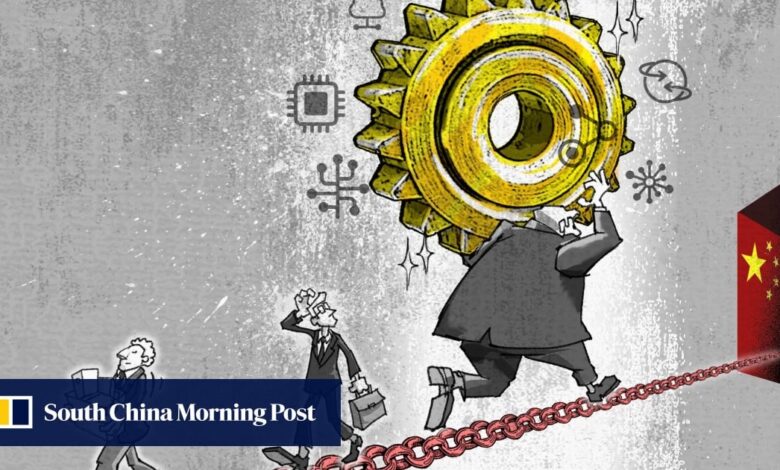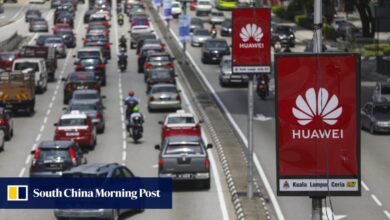In China for China: German firms buck trend, bring best tech and products to compete

“We are full of confidence in the prospects of our China business, as always,” said Zhao Gang, general manager of the German firm’s Suzhou operations.
Amid escalating trade frictions between China and the European Union, and against the backdrop of a broad decoupling trend, the family-run multinational is among a number of European firms – particularly advanced German manufacturers – that remain committed to China.
Zhao spoke highly of China’s investment environment and said local governments were “very supportive” of foreign businesses, while growth potential in the massive market was a big reason behind his company’s optimism.
The firm has seven other assembly factories in the Asia-Pacific region, including Japan, South Korea and Australia, but combined sales in those places account for less than 20 per cent of what is generated by its China operations, he noted.
Joining SEW’s expanding China presence is German lens maker Zeiss, a global front runner in optics and optoelectronics.
The multinational launched a new manufacturing base in Suzhou on July 8 – its third China operation after Shanghai and Guangzhou, according to the Suzhou Daily newspaper.
This marks Zeiss’ “further deepening of localisation in China and upgrading of capabilities in local research and development and manufacturing”, the report said.
Last year, German businesses’ direct investment in China increased by 4.3 per cent to a record-high 11.9 billion euros (US$13 billion) despite their government’s calls to reduce exposure in the country, Reuters reported in February, quoting a study by the German Economic Institute (IW) based on official Bundesbank data.
The total investment in China by German firms in the last three years was equivalent to that they had made in the previous six years, the private economic research institute was quoted as saying.
This is against the backdrop of waning enthusiasm among European companies in recent years amid the region’s struggle to strike a balance between de-risking from China and cooperating with it.
EU investments as a proportion of China’s overall foreign direct investment (FDI) fell from 7.5 per cent in 2018 to 5.3 per cent in 2022, according to an annual FDI statistical bulletin released by the Ministry of Commerce.
We’ve been increasing our purchases from local suppliers, and that proportion has been rising each year
Price pressure due to intense competition amid a rise of local companies is a concern most widely shared by German firms in China, according to a business confidence survey released last month by the German Chamber of Commerce in China (AHK Greater China).
In response to the issue, SEW’s Zhao said that his company “has brought the most advanced technology and products to China” and would continue to win the Chinese market with that.
The company’s sales to third-party purchasers in China cleared 10 billion yuan (US$1.4 billion) in 2021 and saw “steady growth” in the years since, he added.
According to the AHK survey, a slim majority of the companies operating in China – about 53 per cent – planned to increase their investment in the coming two years, though this marked a drop from 61 per cent when asked the same question last year.
That included Phoenix Contact China – another Germany-headquartered global leader in the industrial automation sector.
The firm is scheduled to start building a new logistics centre in Nanjing, Jiangsu province, in the first half of next year to mainly serve its local clients, according to its vice-president, Jiang Shimin.
Purchasing and manufacturing locally to serve the local market has become an important strategy for the company, he said.
“We’ve been increasing our purchases from local suppliers, and that proportion has been rising each year,” he said.
The Chinese government’s efforts in attracting foreign investment since China’s borders reopened in early 2023, including widening market access and loosening visa policies, have also paid off to some extent, according to Benoit Ikhelif, deputy general manager of Danish logistics company DSV’s China operations in Nanjing.
Though the three pandemic years were “not easy”, “we’re still here and still focus on China”, he said.
And a leading contributor to that is that the company has “very good communication with authorities here. They are very flexible, and they came to Sweden” after the pandemic, he noted.
Wooing back foreign investors has been a major economic theme for Beijing in the past year as it strives to keep gross domestic production (GDP) growth at around 5 per cent amid weak investor and consumer confidence.
Emphasising its openness to foreign companies, the Chinese government has pledged to ensure 100 per cent access to the manufacturing sector and to remove more restrictions in the service sector.
At a July 1 meeting on how to further lure foreign investment, Chinese Vice-Premier He Lifeng acknowledged that China’s attractiveness to foreign businesses was its large market, and he urged officials to turn that into “a tangible advantage in attracting investment”.
China attracted 498.9 billion yuan worth of FDI in the first half of this year, down more than 29 per cent from the same period in 2023, according to commerce ministry data.
However, over the same period, the number of newly registered foreign companies saw a 14 per cent rise from a year prior, according to the recently released figures.
Chen Fengying, a researcher with the China Institutes of Contemporary International Relations think tank in Beijing, said that despite recent trade frictions over China’s new-energy products, there was still room for economic collaboration between the EU and China.
Unlike the United States, which is becoming “more nationalist and closed”, Europe is still open, she said.
“Europe is no longer on an equal footing with the US in the world order it faces today. Putting aside ideology, the conflict with us is not as great as the US,” she said.
However, de-risking remains a trend among European firms, she noted, adding that new arrivals of foreign investments are mostly small in scale and backed by overseas Chinese.
Foreign firms operating in China have flagged a series of challenges to their continued operations there. These often-cited hurdles include an uncertain regulatory environment, an unfair playing field when competing with domestic companies, and geopolitical turmoil between China and its Western trade partners.
In contrast with the position of optimistic German manufacturers, there was a sharp overall rise in European firms experiencing a “decoupling” between their headquarters and China operations over the past two years, triggering “a slowdown in existing operations and a reduced ability to capitalise on new projects or investment plans” in China, according to a report released by the EU Chamber of Commerce in China in May.
And behind the decoupling trend, it said, was a declining number of Europeans employed by their China operations. And this factor is said to have contributed to a loss of mutual understanding and trust.
Source link




